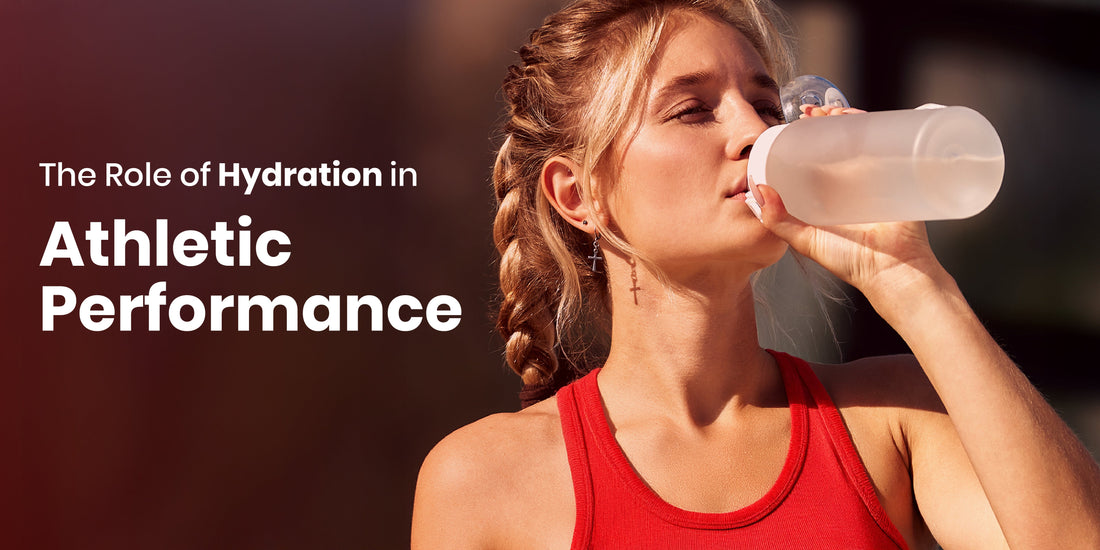
The Role of Hydration in Athletic Performance
byWhether you're a weekend warrior, a professional athlete, or someone just starting out on their fitness journey, one thing remains non-negotiable: hydration. Water isn't just a thirst-quencher - it's the backbone of performance, endurance, recovery, and overall well-being.
Yet, it's one of the most overlooked elements in training and competition. Let’s explore how hydration impacts athletic performance and why staying properly hydrated should be a top priority for every athlete.
Why Hydration Matters in Sports
Water accounts for approximately 60% of the human body and is involved in almost every physiological process. From regulating body temperature and maintaining blood volume to facilitating muscle contractions and nutrient transport, hydration plays a crucial role in athletic success.
Key Functions of Hydration in Athletes:
- Regulates body temperature: During intense workouts or competitions, sweating helps cool the body. Restoring fluid loss is critical to avoiding dehydration.
- Maintains blood flow and oxygen delivery: Dehydration can reduce blood volume, making it harder for the heart to pump oxygen and nutrients to working muscles.
- Avoiding muscle cramps and tiredness: Water helps regulate electrolytes. Muscles that are not well hydrated may become more prone to cramping and early weariness.
- Supports joint lubrication: Well-hydrated joints are less likely to suffer strain or injury during movement.
- Enhances mental focus: Dehydration impacts cognitive function, leading to slower reaction times, poor decision-making, and decreased concentration.
The Impact of Dehydration on Performance
Even a 1-2% decrease in body weight from sweating can drastically hamper performance. Dehydration impairs performance. Here's how dehydration can manifest in athletes:
- Reduced endurance and aerobic capacity
- Decreased strength and power output
- Slower recovery time post-exercise
- Increased risk of stroke and fatigue.
- Mood swings, dizziness, and mental fog
In extreme cases, dehydration can lead to serious medical conditions like heat illness or renal dysfunction.
Signs of Dehydration to Watch For
Recognizing early indications of dehydration allows athletes to take prompt action:
- Dry mouth or throat
- Dark yellow urine or infrequent urination
- Headaches
- Dizziness or light-headedness
- Excessive fatigue
- Muscle cramps
- Elevated heart rate or labored breathing during exercise
How Much Water Do Athletes Need?
Hydration needs vary based on body weight, activity level, environment (heat/humidity), and sweat rate. A general guideline:
- Drink 500-600 milliliters (17-20 ounces) of water 2-3 hours before beginning your exercises.
- During exercise: Sip 200–300 mL (7–10 oz) every 15–20 minutes. If exercise lasts over 60 minutes, include an electrolyte-rich sports drink.
- Rehydrate after exercise with 500-750 mL (17-25 oz) of water for every 0.5 kg (1 lb) of body weight reduction.
Pro tip: Weigh yourself before and after training to estimate fluid loss.
Electrolytes: More Than Just Water
While plain water is essential, electrolytes like sodium, potassium, magnesium, and calcium are crucial to maintaining hydration balance. Sweating causes loss of these minerals, which need to be replenished to prevent cramping, fatigue, and fluid imbalance.
Best ways to replenish electrolytes:
- Sports drinks
- Coconut water
- Electrolyte tablets or powders
- Hydration drinks designed for athletes
Tips to Stay Hydrated
1. Start your day with water – don’t wait to feel thirsty.
2. Carry a reusable water bottle everywhere.
3. Flavor your water with lemon, mint, or berries to make it more appealing.
4. Monitor your fluid consumption with hydration apps or reminders.
5. Hydrate with meals and snacks, particularly fruits and vegetables high in water content.
Conclusion
Hydration is not a one-time act — it's a continuous process that can make or break an athlete’s performance. Whether you're lifting in the gym, training for a marathon, or playing competitive sports, keeping your body hydrated ensures you perform at your peak and recover faster.
Recognize that by the time you become thirsty, you have already lost some water. So, drink smart, drink often, and stay ahead of dehydration.








